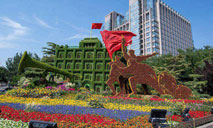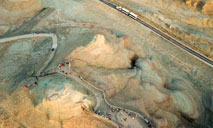China’s ‘whole-process democracy’ explained
In November 1918, Li Dazhao, the great Chinese Marxist and intellectual who co-founded the Communist Party of China (CPC), published two sobering essays in La Jeunesse, then one of China's most influential magazines. Reflecting on the repercussions of the First World War, he came to the conclusion that the global war was a product of the collision of "isms": Pan-Germanism, Japanism, and other forms of imperialism. Such "isms", he believed, boiled down to the hegemonic act of riding roughshod over other nations, and the evil ambition of building a self-centered grand empire catering for its voracious capitalists by means of waging wars.
Two decades after the gory ending of the first World War, the world was once again torn apart by the exact same conflicts of "isms" that Li Dazhao had prophesied and cautioned against. In fact, former US president Woodrow Wilson's desire to "make the world safe for democracy " had never been fulfilled, not after the First World War, not after the Vietnam War, NOT during the course of the War in Afghanistan. The obvious and bitter explanation for the U.S. and some of its allies' persistent failures in imposing and experimenting with their self-branded democracy seemed to be that they had always perpetuated a monopoly over the interpretation of democracy, the one and only democracy they deemed worth recognizing, propagating, and defending, even by force.
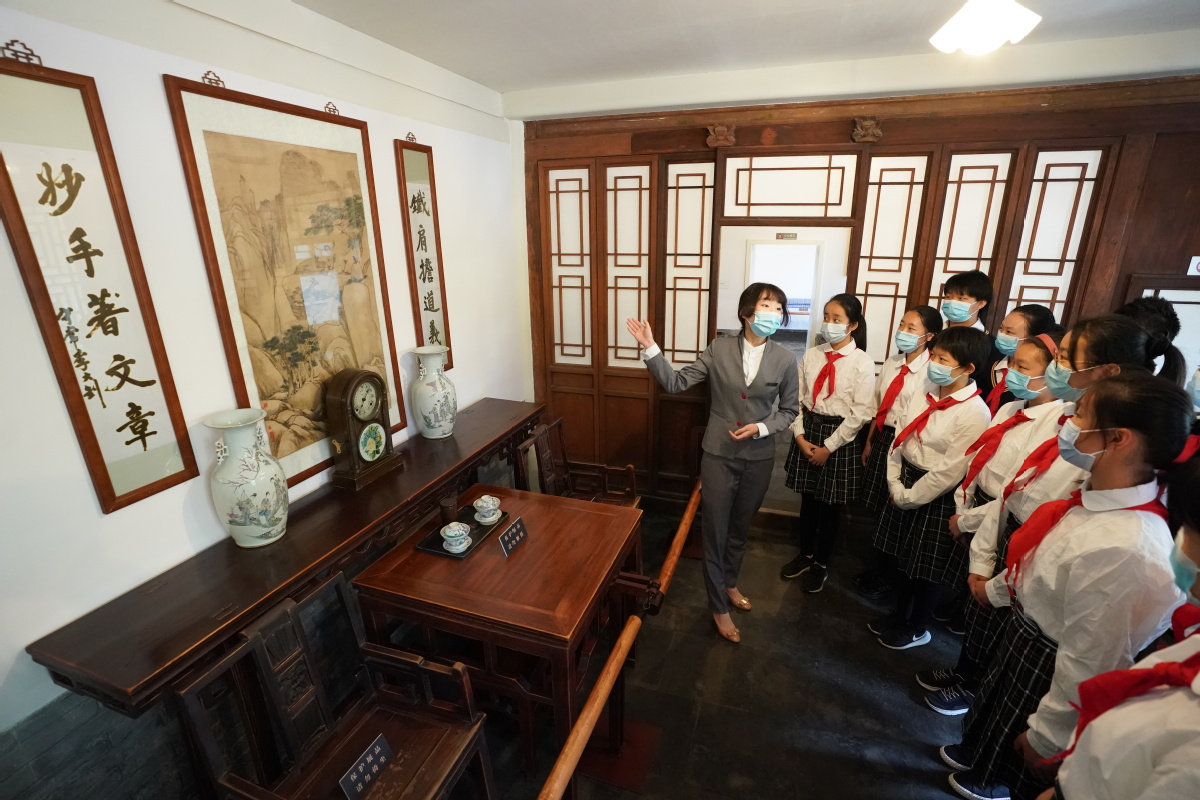
A docent tells the history of Li Dazhao to students at his former residence in Beijing's Xicheng district on Tuesday. [Photo by Yu Zhiqiang/for chinadaily.com.cn]
It was with this conscious awareness of the conflicting “isms” and the disenchantment with the illusion of the exclusive democracy monopolized by hegemonic powers that CPC founding fathers like Li Dazhao decided to resolutely uphold communism, which later rescued the old China from the erosion of semi-colonialism and semi-feudalism and helped it gain independence. Ever since then, the seed of democracy, with a unique breed ideal for the special soils of China, has been sown, waiting to sprout, flourish, and send forth new leaves.
People-centered approach, in whole process
Since the founding of the CPC a century ago, China has, in the face of all foreign aggressions, external interferences and disturbances, found a distinctive path of pursuing and practicing democracy, one that champions a people-centered approach: serving the public good, and exercising power in the interests of the people.
Reviewing the glorious history of the CPC, which is about to celebrate its 100th anniversary this July, the Party has always placed a premium on the people it serves: women and men, seniors and toddlers, students and workers, people from all walks of life, of all ethnic groups.
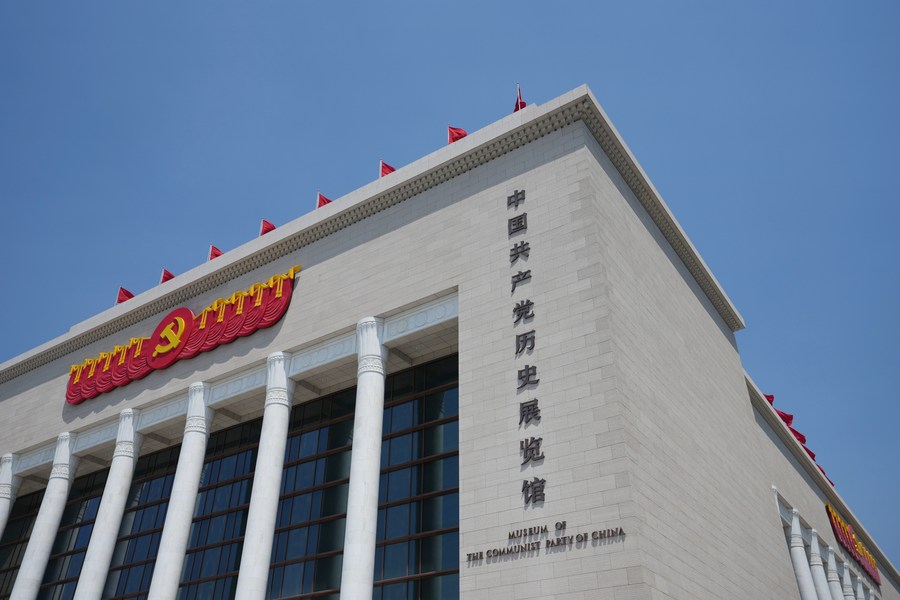
Photo taken on June 22, 2021 shows an exterior view of the Museum of the Communist Party of China in Beijing, capital of China. (Xinhua/Ju Huanzong)
Serving its vast population, which now stands at more than 1.4 billion per the latest national census, and satisfying its need for a better life has, understandably, been a difficult task for China, which remains a developing nation. But instead of representing the interests of just part of its people every four years, turning the elections into an ugly “us against them ” war, or allowing lobbyists to effortlessly sway policy-making in favor of the wealthy and certain interest groups like what some countries are currently undergoing, China aims to reach every group of people, from towns and cities to autonomous regions and municipalities, and aspires to deliver for the greatest number of people to the greatest degree possible.
The model of democracy China has been exercising is not only one designed to serve all people, but is also one that is present in the whole process in people’s lives. “Whole-process democracy”, a term first put forward by Chinese President Xi Jinping, who is also the general secretary of the CPC Central Committee, during his inspection tour in Shanghai in November 2019, is designed to ensure socialist democracy runs through all processes including elections, decision making, administration, and supervision.
Whole-process democracy is “a hallmark of socialist democracy that distinguishes it from various capitalist democratic systems,” said Wang Chen, Vice Chairman of the National People’s Congress (NPC) Standing Committee, China’s top legislative body, during this year’s “Two Sessions,” China’s annual sessions of the top legislature and top political advisory body.
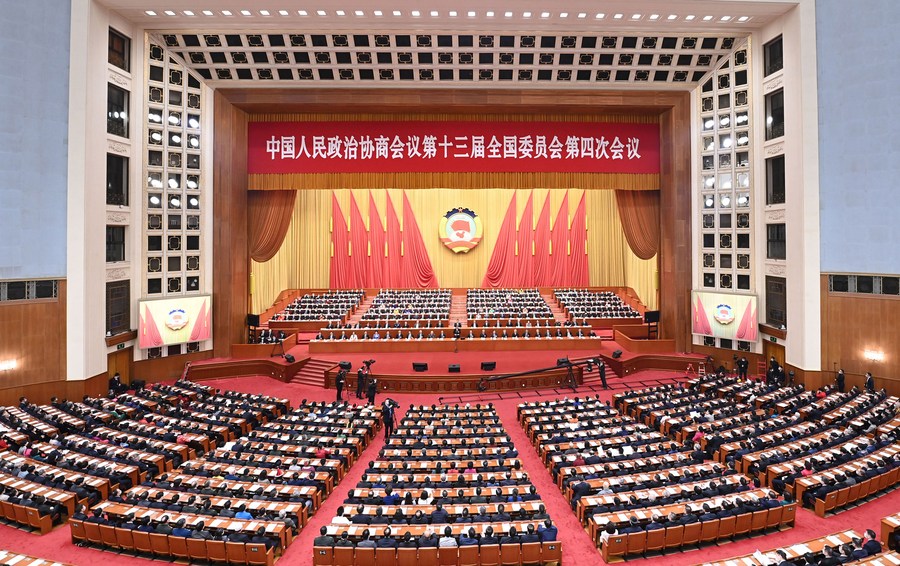
The closing meeting of the fourth session of the 13th National Committee of the Chinese People's Political Consultative Conference (CPPCC) is held at the Great Hall of the People in Beijing, capital of China, March 10, 2021. (Xinhua/Li Xiang)
Luo Feng, professor of the Shanghai Party Institute (Shanghai Administration Institute) , believes that the reason why China’s (whole-process) socialist democracy is authentic and effective lies in the fact that it has avoided the predicament of democracy only working during elections , and has focused on realistic problem-solving.
In a guest essay published this April in Guangming Daily, a renowned Chinese newspaper, the professor pointed out that the modifier whole in “whole-process democracy” has two connotations: one is that the participants of the “whole-process democracy” are the whole group of people, meaning that matters involving many people are discussed by all those involved, in a bid to “reach consensus on the wishes and needs of the whole of society ”; the other is that the model is applied to every link in Chinese people’s lives, ranging from elections and public deliberations to the designing and revision of laws and regulations, not only at the national level but also at the community level.
“Only when the participants of democracy are the people as a whole can public consensus be formed, and only when democracy is seen in every aspect of their lives will people feel the practical and tangible side of democracy, and become all the more motivated to participate,” said Professor Luo in the essay.

Women walk to a blueberry planting base for work at Laoji Village of Butuo County in Liangshan Yi Autonomous Prefecture, southwest China's Sichuan Province, Aug. 13, 2020. (Xinhua/Liu Kun)
Voices heard, jobs done
For Mo Li *, who is retired and currently lives in a residential building on Changning Branch Road in Shanghai, the dovecote on the roof used to be a pain in the neck. The fetid dung and suffocating feathers left by the birds had gotten on her nerves for over a year, during which time she also developed a chronic cough. On May 12 this year, she went onto the Message Board for Leaders, a nationwide message system that collects and responds to public opinions and complaints, to seek help.
Two weeks after she posted her complaints, the annoying dovecote was cleaned and renovated. She later left a message of thanks below her initial complaint message, saying that she was speechless and really grateful for the local government and those who had saved her from the noisy and nasty birds.
Annoying pets. Broken roads. Unpaid wages… No issue is too trivial and every voice matters. The Message Board for Leaders, a down-to-earth and effective channel operated by People’s Daily Online, has helped bring responses to more than 2.3 million messages directly from state agencies and local officials. Since it began operating in 2006, the message board has served as a unique bridge connecting the government with the people, a magnet pooling the wisdom of the public, and a hotline answering the urgent needs and calls from grassroots communities. No petitions and lobbying charges are needed, and the distance between the public servants and the people they serve can be covered with just a click and a tap.

A villager picks apples at an orchard in Taiquan Village of Yichuan County, Yan'an City, northwest China's Shaanxi Province, Oct. 15, 2018. (Xinhua/Liu Xiao)
While continuing to solicit public opinions and allow more voices to be heard by government officials in a timely manner so as to get things done and problems addressed, the format has also cooperated with local governments to bring innovation to how people participate in the “whole-process democracy” and achieve a “one-plus-one-larger-than-two” effect. On May 19, the People’s Daily Online and the Proposal Collection Office of the Shanghai Municipal People's Government, which was opened in July 2020 in an effort to invite more people to participate in the administration of the city, signed a cooperation MOU to join hands and make the metropolis a model of delivering services to the people in the Yangtze River Delta area and in China as a whole.
“By cooperating with People’s Daily Online, we can set up a broader platform for proposal collection,” said Wang Jianhua, director of the Proposal Collection Office at the signing ceremony. “Let us work together to translate the golden ideas of the people into the golden keys to urban governance,” he added.
The Message Board for Leaders represents just a fraction of China’s endeavors to continuously improve its socialist democracy model.
In the bigger picture, China has successfully implemented the System of People’s Congress, the System of Multiparty Cooperation and Political Consultation under the Leadership of the Communist Party of China, and the System of Community Level Self-Governance. They complement each other to form a strong, comprehensive, and all-level network guaranteeing that the light of whole-process democracy shines not only on the Great Hall of the People, the venue for China’s annual “Two Sessions,” but also on the outdoor village court where the hearing on a land dispute takes place, on the small village committees where farmers vote for village heads, and on university disciplinary offices where anonymous report letters are handled…
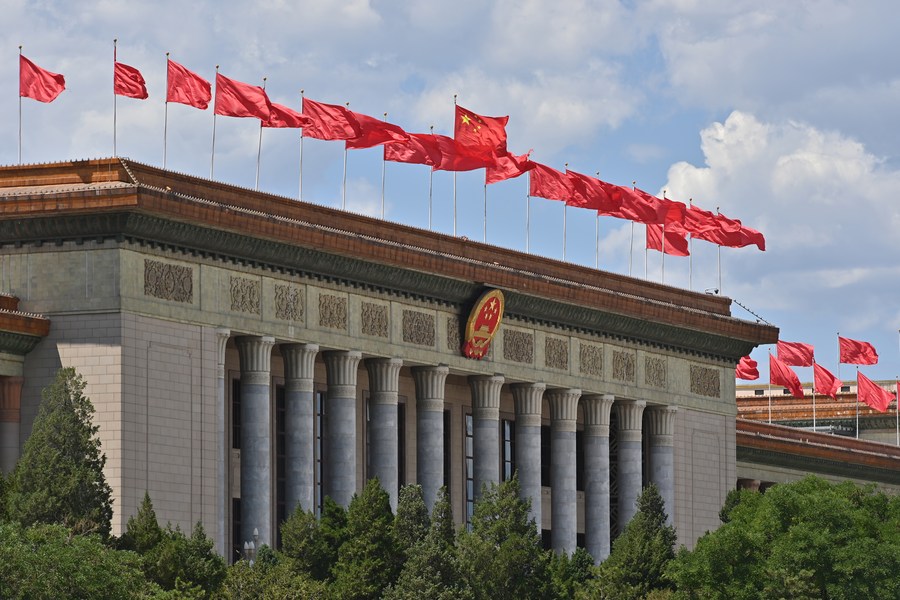
Photo taken on May 27, 2020 shows a view of the Great Hall of the People in Beijing. (Xinhua/Li Xin)
“One of the great misunderstandings is that China is not a democracy,” commented Mario Cavolo, an Italian-American writer and commentator, in an interview with Xinhua News Agency this March. Indeed, despite being invited to China’s annual sessions every single year, many foreign reporters seem to have never summoned the courage to broadcast the whole picture of China’s democracy, if they haven’t already twisted it into a dystopia. Processed by some media’s assembly line of biased news and misinformation, China has, in many cases, been labeled and portraited as “undemocratic”, which is derived from, to borrow a phrase from former US secretary of labor Robert Reich, a “drift toward proto-fascism,” and an unwillingness to accept the reality that China’s model of democracy that differs from theirs and has been working effectively to the satisfaction of the people.
Despite the misrepresentation and misinterpretation of China’s democratic progress, China’s drive to maintain and improve its whole-process democracy won’t stop and won’t be disrupted or interrupted. No democracy is perfect, but at the end of the day, the feeling and sense of fulfillment of its people matter the most, not the feeling of a third country that is eager to define or give lectures on democracy.
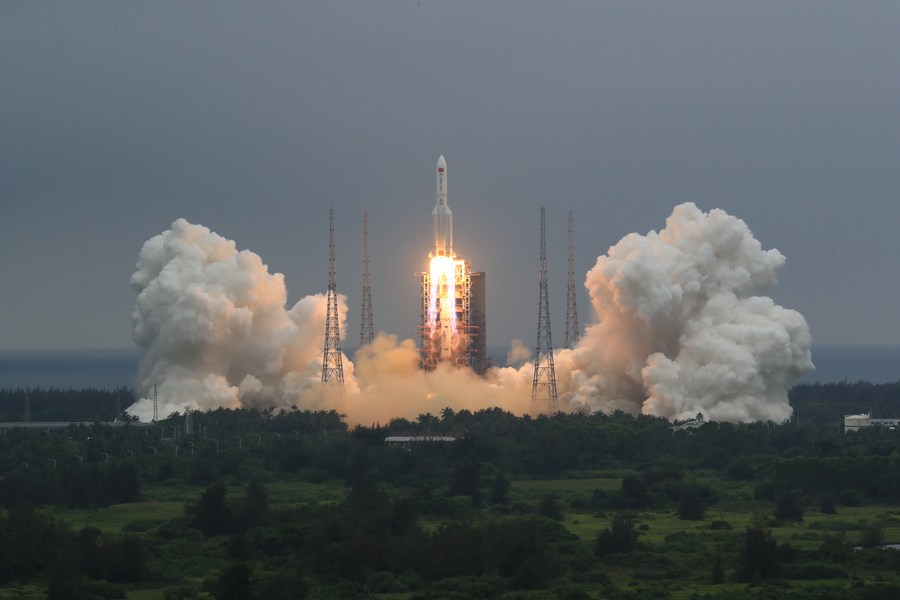
The Long March-5B Y2 rocket, carrying the Tianhe module, blasts off from the Wenchang Spacecraft Launch Site in south China's Hainan Province, April 29, 2021. China on Thursday sent into space the core module of its space station, kicking off a series of key launch missions that aim to complete the construction of the station by the end of next year. (Xinhua/Ju Zhenhua)
On June 17, China successfully sent three taikonauts to Tianhe, its independently developed space station, after years of being shunned from the International Space Station. The crewed mission yet sets another example that although being unrecognized, criticized, or even demonized by some countries, China can still explore its path to fulfill its dream and deliver to its people. And the Chinese people, in return, have every confidence in socialist democracy with Chinese characteristics, and they have all the more reason to believe that the country they live in and love can and will always thrive and strive to find the best way to serve its people.
*Name has been changed for privacy
Photos
Related Stories
- Commentary-Explainer: What's behind CPC's lasting charm among youth
- Non-CPC personages to conduct democratic oversight on Yangtze River protection
- Highlights of foreign congratulatory messages on CPC's 100th founding anniversary (12)
- Visit this immersive center to learn about China’s history over the past century!
- Highlights of foreign congratulatory messages on CPC's 100th founding anniversary (11)
Copyright © 2021 People's Daily Online. All Rights Reserved.








